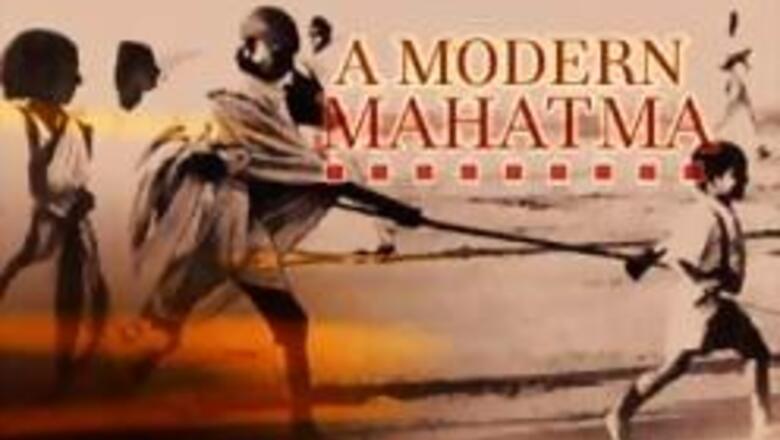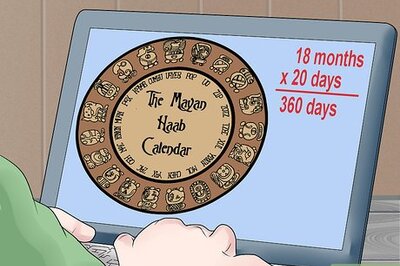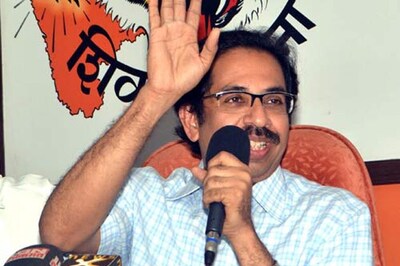
views
“Gandhi to me is silence. Gandhi to me is simplicity. Gandhi to me is self-dependency. Gandhi is history, so are his words; they are for the era of yesterday. Gandhigiri does not work with animals of today, it works only with people who have compassion." - Guru Prasad, an IBNLive reader.
"Gandhi is not just the surname of a person. It means truth, non violence, equality, forgiveness, respect for all religions and love for all mankind. Since these basic values never change, I firmly believe that Ganghigiri is relevant not only now but forever. They may not yield quick results. But in the long run they and they only provide permanent solutions to long standing problems." - R Sailaja, an IBNLive reader.
New Delhi: Mohandas Karamchand Gandhi has been one of the most intriguing subjects of debate, both among historians and intellectuals.
Be it his universal messages of truth and non-violence or his phenomenal journey from a practicing barrister to a dhoti-clad, lathi-wielding Mahatma (saint), Gandhi has always had his share of faithful followers as also his fiercest critics and detractors.
But somewhere down the line, Gandhi was forgotten.
In a world shorn with violence, his principles became a subject of mockery and his messages got lost in the pages of musty history textbooks – crammed by schoolkids as yet another compulsory subject, but never really understood.
But now, Gandhi is staging a comeback. And a phenomenal comeback at that. He’s once again taking centrestage in popular culture through the medium of masses – cinema.
Lage Raho Munnabhai has evoked a renewed interest in the Father of the Nation – something that some movies in the past intended, but never really got there.
In the runup to his 137th birth anniversary ibnlive.com asked its readers if this transition from Gandhism to the more ‘it’ Gandhigiri can work in the present day and age.
Readers wrote in with their opinions.
Some responses were jingoistic - clearly indicative of the popular mood - while others were more practical and almost rang true. Like Kapil Parmar, who wrote, “Gandhigiri can not be implemented like a rule or regulation. It’s a thought process and will take time to grow back again. The transition from Dadagiri to Gandhigiri has to be gradual. One cannot change the system suddenly.”
Then, there were readers like Shane, who believed that Gandhi was being “mocked” in the guise of Gandhigiri. “It’s absolutely funny to see youngsters crazy about Gandhi. I strongly feel that he is being mocked off. He is neither Madonna or Eminem or Sachin Tendulkar to have his name printed on T-shirts. He is close to God, worthy of being placed with the likes of Krishna, Jesus. I am really sad to see him so much publicised. It’s heartbreaking to see Gandhi being used as a fashion statement , without even following the principles to the minimal. If you can still pick up an youth who doesn’t drink, is a veggie, follows ahimsa (non-violence), satya (truth) and brahmacharya (sexual abstention) and religioun – that’ll be a feat. These principles should come on their own but our youth seems to be picking them up from Munnabhai. If there’s an anti-Gandhi, they’ll support Godse.”
Then there are some who are disillusioned, almost anguished at the very use of the word Gandhigiri. A reader who prefers to call himself Mediawallah writes, “No it doesn’t work. But what certainly work is power and politics and lack of morality in media. Call it mediagiri folks. You have for some reason not been able to curtail the misuse, which is an abuse of this word. Yet Gandhigiri? Ask any linguist, it is an assault. And is media uses and promotes such dishonesty.”
Point taken. But has Gandhigiri worked for anyone in real life or is it just limited to the fancies of reel-life?
It seems to have worked for reader Parthiv Raval who remained steadfastly truthful in time of crises. He writes, “When I was studying in a school in Gandhinagar, my classmates were afraid of me as I spoke truth whatever the situation may be. Once me and my room partners went to watch a movie without prior permission from our hostel warden. The next day he caught us and called us to his room. When he asked as to who all had gone for the movie, most of my friends answered in the negative. All eyes were on me as they knew that I would speak the truth. I replied "yes". We all were punished and were made to clean the hostel. All roommates were very angry with me and started teasing me as "Gandhi Bapu". Then during the annual prize distribution ceremony, our campus director Somabhai Patel – also a Gandhian – was the chife guest. Though I had not been nominated in any category, the chief guest asked a gatherinmg of 600 if anyone followed Gandhi’s principles. I raised my hand, fearing people would laugh. But Sombhai said, “Today I decided that the person who will raise the hand and believes in the Gandhiji's thoughts, I will give him the trophy.” So I got the prize for being truthful. This incident is one of the most memorable days of my life.”
PAGE_BREAK
It wasn’t just Raval who ‘experimented with truth’. Reader Ulhas Shirke also had a similar experience in Mumbai. He met a taxi driver who refused to accept money from a stranded old lady and brought her safely home.
“May be he was inspired by Munnabhai or maybe he was just a good Samaritan. But I assured him I will do the needful, as it’s very rare to meet people like him,” Shirke writes.
Then there are others like Ram who has another perspective on Gandhism in the modern day, “Gandhiji lived in a two-piece apparel and still got us the freedom from the militarily powerful country. Is there any body like him now? No. But why can't our own government grant economic freedom to our own people even after 60 years. By economic freedom for the common man, I mean hassle-free, decent living where weak and poor also get two meals a day if nothing more. Common people are least bothered about Nuclear deals, moon missions or Pokhran tests.”
Readers like Prayukth are more acerbic in their approach, “I fail to understand why we have such half baked debates again and again on the Mahatma. Let’s be clear about one thing - Gandhiji was a very important factor responsible for India's freedom. He was the one who gave a direction to the Indian freedom movement which, till his arrival, was spread in small disorganised units across the country. Most people have never read the Mahatma's autobiography and have the tenacity to critisise him with thoughts implanted by people who have never understood the greatness of Mahatma.”




















Comments
0 comment